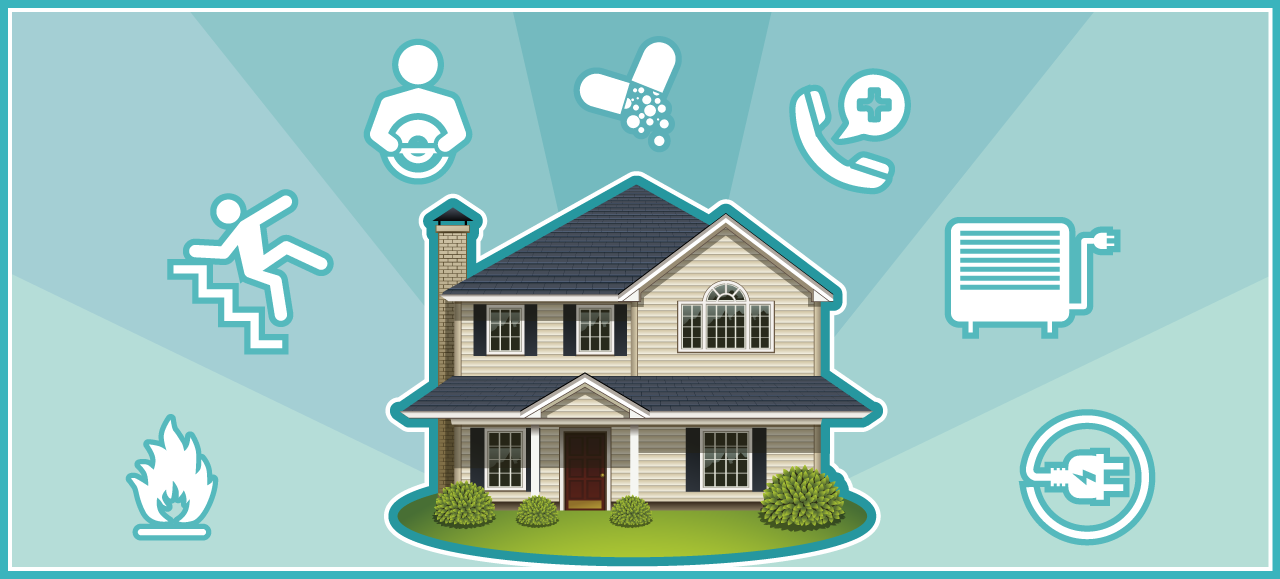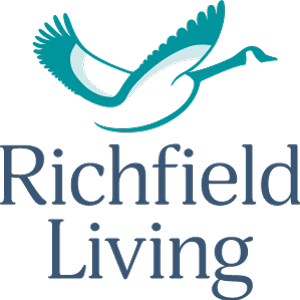Feeling Secure at Home: Household Safety Tips for Retirees

We’re living longer than ever these days and most of us – nearly 90 percent of people over 65 according to AARP – want to spend those ‘extra’ years at home. But at the same time, the prospect of aging at home can be intimidating for retirees particularly if you live alone. You may have questions about safety, managing the household as you age, if your home can accommodate your evolving health needs; the list could go on. We can help you to feel more secure with these household safety tips for retirees.
Tip 1: Fall Prevention
Nearly a third of Americans aged 65 and older fall each year and about half of all falls that require hospitalization take place at home, according to the CDC. What can you do? Make sure walking paths are free of clutter and have adequate lighting, remove throw rugs, get a reach stick for items on high shelves, install grab bars and non-slip mats in the bathroom and make sure you have the appropriate mobility devices to move around the home safely.
In addition, The Lifetime Home, created by the Fall Prevention Center of Excellence at the University of Southern California Leonard Davis School of Gerontology, is an interactive resource in which you can go room-by-room to identify potential hazards as well as fixes.
Tip 2: Emergency Preparedness
All households should be prepared for emergencies, but as you age and/or live alone it’s critical. To start, have emergency contact info readily available for the police, fire department, poison control or even neighbors and identify at least two ways to exit your home.
Conduct a fire safety check on a regular basis and test smoke alarms every six months. Install carbon monoxide detectors near all bedrooms and test them twice a year as well. Also, make sure you have fire extinguishers in easily accessible places. General fire safety rules include:

- Avoid wearing loose clothes or clothes with long sleeves when cooking.
- Replace household items that have fraying or damaged electrical cords.
- Don’t overload electrical outlets or extension cords.
- Never leave candles burning, even for a short time, in an empty room.
- Ensure heaters are at least three feet away from anything flammable and turn off space heaters when you leave the room.
It’s also a good idea to have a generator in case of a power outage to keep oxygen and dialysis machines functioning. Last, but certainly not least, consider a personal emergency alert system. This wearable call button puts you in touch with a dispatcher to contact first responders and/or a friend or family member in the event you need emergency help.
Tip 3: Medication Management
With retirees often managing multiple prescription medications each day, it’s easy to see how mistakes can be made. In fact, adverse drug events account for approximately 280,000 hospitalizations annually according to the Department of Health and Human Services.
To reduce your likelihood for error:

- Always follow your doctor’s instructions and read the package insert.
- Take medications as long as prescribed, even if you feel better.
- Get prescriptions refilled early to avoid running out.
- Keep track of medications and dosage times with written charts, pill containers that organize by day and time or even apps that allow you to set alarms.
Tip 4: Personal Safety
Unfortunately, retirees are a favorite target of scam artists. According to the National Council on Aging, 1 in 10 Americans aged 60 and older experience some form of abuse over the course of a year. Financial elder abuse – being coerced, bullied or tricked into relinquishing assets – is the most common form to the tune of $36.5 billion based on a 2015 study by the financial services company TrueLink. AARP reports that the average victim of financial exploitation loses $120,000.
These facts aren’t meant to scare you; rather to make you aware as knowledge can empower you. And so can these scam-busting tips:

- Discuss offers made by telemarketers with a trusted friend or family member.
- Never share personal information – social security number, credit card, bank information or account passwords – with strangers who contact you or in any suspicious situation.
- Always ask for written details of any offers or prizes and wait to respond until you have reviewed the information thoroughly.
- Don’t be pressured into making purchases, signing contracts or making donations until you’ve discussed it with a trusted family member or friend.
Tip 5: Driving Safety
For many retirees, driving equals independence. But as we age, weaker muscles, reduced flexibility and range of motion limitations can impede our ability to grip and turn the steering wheel, press the accelerator or brake or even reach to open doors and windows according to AAA. That’s why it’s so important to keep up with regular physicals and hearing and vision checkups to proactively manage any issue that could affect your driving.
 In addition, AARP and AAA offer safe driving refresher courses that can not only improve your safety, but completion can also result in auto insurance discounts. AAA also has clinics with trained technicians and occupational therapists to help you identify the right type of vehicle for you and go over smart car features that may be available.
In addition, AARP and AAA offer safe driving refresher courses that can not only improve your safety, but completion can also result in auto insurance discounts. AAA also has clinics with trained technicians and occupational therapists to help you identify the right type of vehicle for you and go over smart car features that may be available.
Safety at Home can Cost
While the tips above are sure to help you feel secure in aging at home, it can be a lot to manage. And this is your retirement right!?! The cost of safety upgrades is not insignificant either, with the installation of wheelchair ramps and bathroom handrails running in the thousands of dollars alone. Should you need to widen doorways, adjust flooring or do more substantial remodeling the cost could rise exponentially.
However, there are other options to keep in mind. Senior living communities are designed specifically for retirees with safety features such as emergency alert systems, grab bars, ramps, transportation and generators as standard. They also offer many additional benefits that include a carefree lifestyle, social opportunities, a host of amenities, daily support and onsite medical care.

